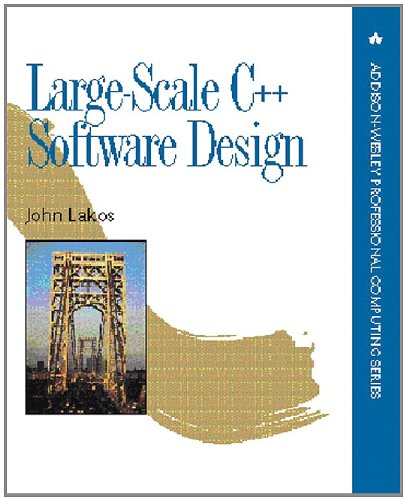Download free textbooks pdf Large-Scale C++ Software Design
Large-Scale C++ Software Design by John Lakos


- Large-Scale C++ Software Design
- John Lakos
- Page: 870
- Format: pdf, ePub, mobi, fb2
- Publisher: Addison Wesley
Download Large-Scale C++ Software Design
Download free textbooks pdf Large-Scale C++ Software Design
Overview
As a member of the IC Division at Mentor Graphics Corporation, I am fortunate to have worked with many bright, talented software engineers, developing very large systems.
Many valuable lessons were learned along the way - knowledge obtained through bitter experience. There were no books to help guide the design process; object-oriented designs on this scale had never before been attempted.
During my 13 years as a C (turned C++) Computer-Aided Design (CAD) software developer, I have seen over and over again that planning ahead invariably produces a higher-quality, more maintainable product. My emphasis at Mentor Graphics has been on helping to ensure that quality is an integral part of the design process from the very start.
Audience Large-Scale C++ Software Design was written explicitly for experienced C++ software developers, system architects, and proactive quality-assurance professionals. This book is particularly appropriate for those involved in large development efforts such as databases, operating systems, compilers, and frameworks.
Yet most of the advice presented in this book also applies to small projects. It is typical for a person to start with a small project and then begin to take on larger and more challenging enterprises. Often the scope of a particular project will expand, and what starts out as a small project becomes a major undertaking. The immediate consequences of disregarding good practice in a large project, however, are far more severe than they are for disregarding good practice in a smaller project.
An object-oriented design book geared specifically to practical aspects of the C++ programming language. A C++ programming book describing how to use the C++ programming language to develop very large systems.
In short, if you feel that you know C++ well, but would like to understand more about how to use the language effectively on large projects, this book is for you.
Except where otherwise indicated, all examples in this text are intended to represent "good design." Examples presented in earlier chapters are therefore consistent with all practices recommended throughout the book. A disadvantage of this approach is that you may see code that is written differently from the code you are used to seeing, without yet knowing exactly why. I feel that being able to use all of the examples in the book for reference compensates for this drawback.
The second exception is the inconsistent use of package prefixes in the early examples of the book. In a large project environment package prefixes are required, but they are awkward at first and take some getting used to. I have elected to omit the consistent use of registered package prefixes until after they are formally presented in Chapter 7, so as not to detract from the presentation of other important fundamental material.
Developing large systems in C++ is a constant series of engineering trade-offs. There are almost no absolutes. It is tempting to make statements using words such as never and always. Such statements allow for a simplified presentation of the material. For the level of C++ programmers whom I expect will read this book, such sweeping statements would be challenged - and rightly so. To avoid getting side-tracked in such situations, I will state what is (almost) always true, and then provide a footnote or a pointer to the exceptional case.
Header File Extensions:
Implementation File Extensions: .c .cxx .C .c++ .cc .cpp
A Road Map There is a lot of material to cover in this book. Not all readers will have the same background. I have therefore provided some basic (but essential) material in Chapter 1 to help level the field. Expert C++ programmers may choose to skim this section or simply refer to it if needed. Chapter 2 contains a modest collection of software design rules that I would hope every experienced developer will quickly ratify.
PART I: BASICS
Chapter 2: Ground Rules. Important design practices that should be followed in any C++ project.
PART II: PHYSICAL DESIGN CONCEPTS
Chapter 4: Physical Hierarchy. The importance of creating a hierarchy of components with acyclic physical dependencies for testing, maintainability, and reuse.
From the Back Cover
0201633620B04062001
Links: Download ebook italiano pdf The Oxford Handbook of Swedish Politics by Jon Pierre English version 9780198803119 download link, Search download books isbn The Perfect Gentleman: A Muslim Boy Meets the West link, Book download guest A Japanese Constellation: Toyo Ito, SANAA, and Beyond RTF FB2 MOBI by Pedro Gadanho 9781633450097 here, Free download textbook The Serious Goose in English by Jimmy Kimmel RTF iBook read book, Google book free download pdf Beginning Databases with PostgreSQL: From Novice to Professional ePub by Richard Stones, Neil Matthew (English literature) 9781590594780 download pdf, Libros descargables completos The Quality of Silence: A Novel de Rosamund Lupton 9781101903674 (Spanish Edition) PDB DJVU site, Free download of audio books mp3 Space Vehicle Design, Second Edition FB2 RTF 9781563475399 (English literature) site, Download full books from google books Innovation, Product Development and Commercialization: Case Studies and Key Practices for Market Leadership in English read book, Mobi ebooks downloads The Shadow of Vesuvius: A Life of Pliny by Daisy Dunn MOBI PDB CHM in English 9781631496400 download link, Descargar libros de isbn number 75 Floral Blocks to Crochet: Beautiful Patterns to Mix and Match for Afghans, Throws, Baby Blankets, and More in Spanish PDB 9781250013323 pdf,